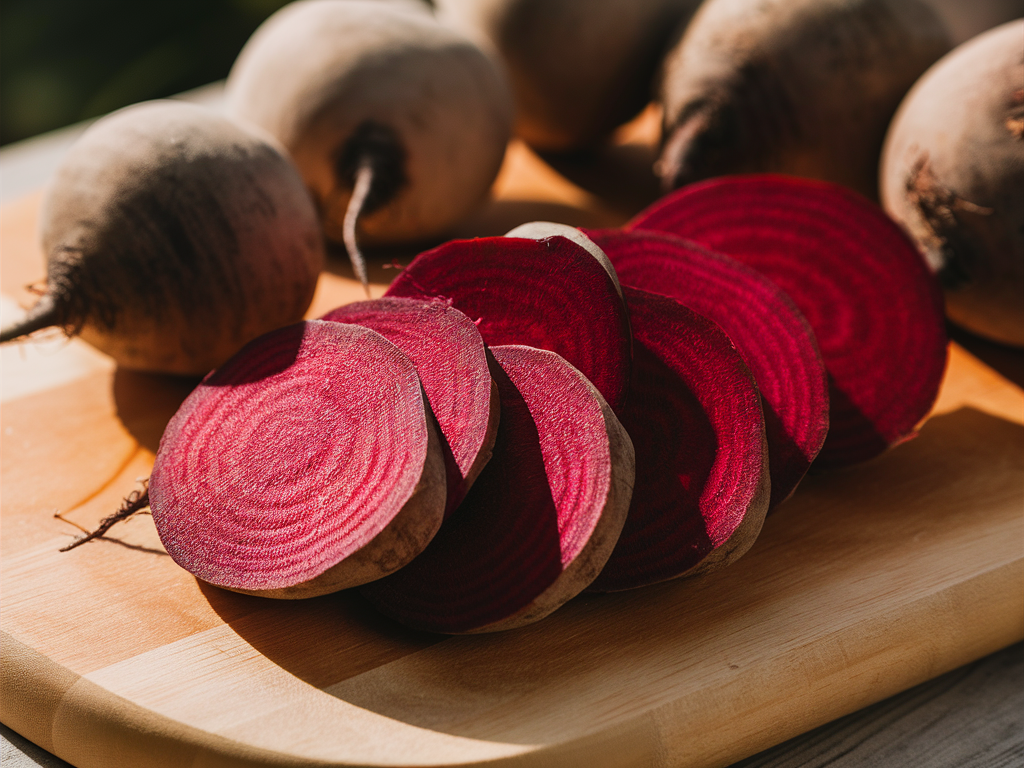Beets are one of nature’s most impressive superfoods, boasting a vibrant color that signals their potent nutritional profile. These humble root vegetables have been cultivated for thousands of years, not only for their distinctive earthy flavor but also for their remarkable health-promoting properties. Beyond their striking appearance, beets contain a powerful combination of vitamins, minerals, and plant compounds that can significantly impact your overall health and wellbeing. In this comprehensive guide, we’ll explore eleven science-backed benefits of beets that demonstrate why this ruby-red vegetable deserves a regular place in your diet.
1. Rich in Essential Nutrients
Beets (Beta vulgaris) are nutritional powerhouses packed with an impressive array of vitamins and minerals while remaining relatively low in calories. A 100-gram serving of cooked beetroot contains approximately:
- 43 calories
- 1.6 grams of protein
- 0.2 grams of fat
- 9.6 grams of carbohydrates
- 2 grams of fiber
- 20% of the Daily Value (DV) for folate
- 16% DV for manganese
- 13% DV for potassium
- Significant amounts of vitamin C, magnesium, and iron
What sets beets apart is that both the root and greens are edible and nutritious. Beet greens actually contain even higher concentrations of vitamins A, K, and calcium than the roots, making them an excellent addition to salads or sautés. This root-to-stem approach maximizes the nutritional benefits while minimizing food waste.
2. Lowers Blood Pressure
One of the most well-established benefits of beets is their ability to reduce blood pressure, particularly systolic blood pressure (the top number in a blood pressure reading). This effect is attributed to their high concentration of dietary nitrates, which the body converts into nitric oxide—a molecule that relaxes blood vessels and improves blood flow.
A meta-analysis published in the Journal of Nutrition found that beetroot juice consumption significantly lowered systolic blood pressure by an average of 4-10 mmHg in just a few hours. This reduction is comparable to the effects of some blood pressure medications and could translate to a 10% reduction in heart disease risk.
For those managing hypertension, consuming about 250ml of beetroot juice or 1-2 medium-sized beets daily appears to provide optimal benefits. The blood pressure-lowering effect is most pronounced 3-6 hours after consumption, suggesting that timing your intake could maximize cardiovascular benefits.

3. Improves Athletic Performance
Beetroot juice has gained popularity among athletes and fitness enthusiasts as a natural performance enhancer. The nitrates in beets improve oxygen use efficiency and extend exercise duration by:
- Enhancing mitochondrial efficiency—allowing cells to produce energy with less oxygen
- Improving muscle contraction efficiency
- Increasing blood flow to working muscles
A systematic review in the Journal of Applied Physiology found that beetroot supplementation improved endurance performance by 1-3% in time trial events—a significant margin in competitive sports. Another study with cyclists demonstrated that drinking 500ml of beetroot juice 2.5 hours before exercise allowed them to ride up to 16% longer before exhaustion.
For optimal performance benefits, research suggests consuming beetroot juice or 200-300g of cooked beets approximately 2-3 hours before exercise. This timing allows nitrate levels in the bloodstream to peak when you need them most.
4. Reduces Inflammation
Chronic inflammation is linked to numerous diseases, including heart disease, diabetes, and cancer. Beets contain powerful anti-inflammatory compounds, primarily betalains (which give them their vibrant color), that can help combat inflammation throughout the body.
Research published in the Journal of Human Hypertension found that betalain-rich beetroot extract significantly reduced inflammatory markers like C-reactive protein (CRP) and tumor necrosis factor-alpha (TNF-?). These compounds work by inhibiting the activity of specific enzymes that trigger inflammatory responses.
Compared to other anti-inflammatory foods, beets offer a unique profile of compounds not found in many other vegetables. While turmeric contains curcumin and berries offer anthocyanins, beets’ betalains provide distinctive and complementary anti-inflammatory benefits, making them valuable additions to an anti-inflammatory diet.
5. Supports Digestive Health
Beets contribute to digestive wellness through multiple mechanisms. With approximately 2-3 grams of fiber per cup, they provide bulk to stool and promote regular bowel movements. Their fiber content includes both soluble and insoluble types, supporting overall digestive function.
Beyond fiber, beets function as prebiotics—compounds that nourish beneficial gut bacteria. The specific type of fiber in beets, particularly oligosaccharides, serves as food for probiotics like Lactobacilli and Bifidobacteria, helping them thrive and maintain a balanced microbiome.
Research from the Journal of Nutritional Biochemistry indicates that the combination of fiber and betaine in beets may help prevent digestive conditions like inflammatory bowel disease by strengthening the intestinal lining and reducing inflammation in the digestive tract.
6. Potential Anti-Cancer Properties
The betalains in beets don’t just give them their distinctive color—they also possess significant antioxidant, anti-inflammatory, and potential chemopreventive capabilities. These compounds help neutralize free radicals that can damage DNA and initiate cancer development.
Multiple laboratory studies have shown that beetroot extract can inhibit the growth of cancer cells. Research published in the International Journal of Cancer demonstrated that betanin, a major component of beetroot extract, reduced tumor formation and slowed cancer cell growth in several types of cancer, including breast, prostate, and pancreatic cancers.
While human studies are still limited, beets appear particularly promising for colorectal cancer prevention. Their fiber content, combined with their ability to modulate inflammation and oxidative stress in the digestive tract, creates a protective environment that may reduce cancer risk.
7. Enhances Brain Health
The nitrates in beets don’t just benefit the heart and muscles—they also improve cognitive function by increasing blood flow to the brain. As we age, reduced blood flow to the brain is associated with cognitive decline and dementia.
A fascinating study published in the Journal of Gerontology showed that older adults who consumed a high-nitrate diet (including beetroot juice) experienced increased blood flow to the frontal lobes—areas associated with executive function, working memory, and decision-making.

Additional research in the Journals of Gerontology found that beetroot juice supplementation improved reaction time and promoted a brain connectivity pattern resembling that of younger adults. These findings suggest that regular beet consumption might help maintain cognitive function and potentially slow age-related mental decline.
8. Promotes Heart Health
Beets support cardiovascular health through multiple pathways, making them particularly valuable for heart health maintenance. Beyond their blood pressure-lowering effects, beets may:
- Reduce LDL (“bad”) cholesterol oxidation, a key factor in atherosclerosis development
- Improve endothelial function, enhancing the flexibility and responsiveness of blood vessels
- Lower homocysteine levels, an amino acid linked to heart disease when elevated
The betaine compound in beets helps lower homocysteine levels, while their polyphenols and betalains reduce oxidative stress in blood vessels. A study in the American Journal of Physiology found that beetroot juice improved vascular function in patients with heart failure by enhancing cardiac output and dilating blood vessels.
The combination of these effects makes beets a particularly heart-friendly vegetable that addresses multiple risk factors for cardiovascular disease simultaneously.
9. Supports Liver Function and Detoxification
The liver is our primary detoxification organ, and beets contain several compounds that support its function. Betaine, a natural amino acid in beets, helps the liver process fats and protects liver cells from toxic damage.
Research from the World Journal of Gastroenterology found that betaine supplementation significantly reduced liver fat accumulation and improved markers of liver function in patients with non-alcoholic fatty liver disease (NAFLD). The antioxidants in beets also help reduce oxidative damage to liver tissue during detoxification processes.
Beets’ fiber content further supports detoxification by promoting regular elimination of toxins through the digestive tract. This comprehensive approach to supporting detoxification makes beets a valuable addition to any liver support protocol.
10. Helps Manage Weight
With just 43 calories per 100-gram serving, beets offer substantial nutritional value while supporting weight management goals. Their high water and fiber content promotes satiety—that feeling of fullness that can prevent overeating and unnecessary snacking.
The soluble fiber in beets slows digestion and helps stabilize blood sugar levels, potentially reducing cravings and maintaining steady energy. Additionally, betalains may support fat metabolism, though more research is needed in this area.
A study in the Journal of Nutrition and Metabolism found that participants who consumed beetroot juice before meals reported greater fullness and consumed fewer calories overall compared to those who didn’t. While beets aren’t a magic weight loss solution, they can be a valuable component of a whole-food, nutrient-dense approach to weight management.
11. Improves Skin Health
The antioxidant compounds in beets offer significant benefits for skin health and appearance. Betalains, vitamin C, and other antioxidants help neutralize free radicals that contribute to premature aging, wrinkles, and skin damage.
The anti-inflammatory properties of beets may help reduce skin redness and irritation associated with conditions like acne and eczema. Additionally, beets contain silica, a mineral that supports collagen production—essential for skin elasticity and strength.

Beyond internal consumption, topical application of beet juice or purée can provide direct benefits to the skin. Some studies suggest that the compounds in beets can help lighten dark spots, reduce hyperpigmentation, and give the skin a natural, healthy glow. However, caution is advised as beetroot can temporarily stain the skin.
Conclusion
Beets truly earn their superfood status through their diverse array of health benefits supported by scientific research. From improving cardiovascular health and athletic performance to supporting brain function and digestion, these vibrant root vegetables offer remarkable nutritional value.
Incorporating beets into your diet doesn’t have to be complicated. Consider these easy options:
- Roast beets with olive oil and herbs as a side dish
- Add raw beets to salads for crunch and color
- Blend them into smoothies with berries to mask their earthy flavor
- Juice them with apples and carrots for a nutritious beverage
- Pickle them for a tangy, long-lasting option
- Sauté beet greens as you would spinach or kale
While beets offer numerous health benefits, they’re high in oxalates, which may contribute to kidney stone formation in susceptible individuals. Additionally, their high nitrate content may interact with certain medications, and their strong pigments can cause harmless but alarming red-colored urine or stool (beeturia). As with any dietary change, consult with a healthcare provider if you have specific health concerns.
By regularly including beets in your diet—aiming for 1-2 servings per week—you can take advantage of their impressive nutritional profile and support your overall health and wellness naturally.

